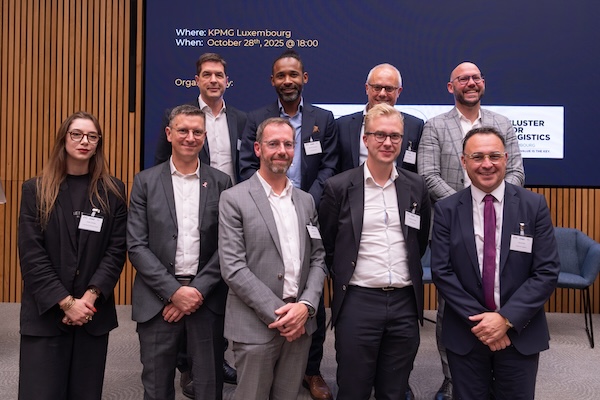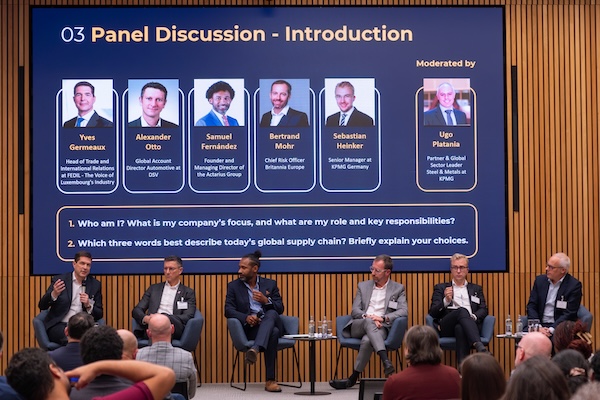 (Front) Axelle Salvage, Luxembourg Maritime Cluster; Alexander Otto, DSV; Bertrand Mohr, Britannia Europe; Sebastian Heinker, KPMG Germany; Daniel Kohl, C4L; (back) Yves Germeaux, FEDIL; Samuel Fernandez, Actarius; Ugo Platania, KPMG; Yves Thorn, KPMG;
Credit: Ali Sahib, Chronicle.lu
(Front) Axelle Salvage, Luxembourg Maritime Cluster; Alexander Otto, DSV; Bertrand Mohr, Britannia Europe; Sebastian Heinker, KPMG Germany; Daniel Kohl, C4L; (back) Yves Germeaux, FEDIL; Samuel Fernandez, Actarius; Ugo Platania, KPMG; Yves Thorn, KPMG;
Credit: Ali Sahib, Chronicle.lu
On Tuesday 28 October 2025, KPMG Luxembourg, the Luxembourg Maritime Cluster and the Cluster for Logistics (C4L) hosted a panel discussion, titled “How to Navigate Supply Chain Uncertainty and Complexity in the Context of Geopolitical Instability”, at KPMG’s premises in Luxembourg-Kirchberg.
The discussion addressed how a lack of visibility impacts compliance, risk management and operational efficiency. It explored how businesses can navigate supply chain uncertainty and complexity amid ongoing geopolitical challenges, digital risks and global disruptions such as conflicts, pandemics and natural disasters, with insights from experts in logistics, industry and consulting.
The event started with an opening speech by Yves Thorn, Partner Corporate and Public Sector Market Leader at KPMG, who outlined how the Suez Canal blockage in 2021 and ongoing wars in Ukraine and the Middle East have shifted priorities from cost to security and reliability. Citing a Financial Times article, he noted: “Gone are the days of prioritising streamlined operations and low-cost supply chains.”
Daniel Kohl, Director of the Cluster for Logistics, expanded on systemic pressures stating that “geopolitical instability isn’t a passing storm. It’s a new climate.”
The programme continued with the panel discussion, moderated by Ugo Platania, Partner and Global Sector Leader for Steel and Metals at KPMG, and featuring: Yves Germeaux, Head of Trade and International Relations at the Fédération des Industries Luxembourgeoises (FEDIL); Alexander Otto, Global Account Director Automotive at DSV; Samuel Fernandez, Founder and Managing Director of the Actarius Group; Bertrand Mohr, Chief Risk Officer at Britannia Europe; and Sebastian Heinker, Senior Manager at KPMG Germany.
The panellists reflected on how today’s supply chain environment is shaped by unpredictability, overregulation, challenges, dynamism and friction. Moderator Ugo Platania observed that, while technology and artificial intelligence (AI) are commonly discussed topics today, the conversation instead centred on people and operational processes.
Alexander Otto remarked that “it’s not the tariff itself, it’s the unplanability and volatility” that pose the greatest challenges today. Yves Germeaux noted that tariffs often have a stronger indirect impact than a direct one and stressed the need for predictability, diversification of suppliers and expansion into new markets beyond traditional partners such as the United States (US) and China, pointing to growing potential in regions like Latin America and Southeast Asia.
Bertrand Mohr emphasised the importance of integrating data systems with human expertise and shared examples from the maritime sector, where tools such as Automatic Identification System (AIS) tracking enhance resilience during geopolitical disruptions. He also underlined the need for a balance between technology and human judgment as the key foundation for stability. Sebastian Heinker underlined the need for full supply chain visibility, rapid response and regionalisation, noting that “close circles” of trade are forming as companies localise operations.
The panel closed with Yves Germeaux adding that Europe must stop being “the best student in class” by overregulating while other regions play by different rules. Citing an International Monetary Fund (IMF) study, he noted that inefficiencies within the European internal market amount to a 45% tariff on goods and 110% on services. He mentioned the Corporate Sustainability Due Diligence Directive (CSDDD) and the upcoming Omnibus Agreement vote in the European Parliament from 11 to 13 November 2025, noting their impact on supply chains and trade relations. He added that Europe must ensure a level playing field and remain realistic about global trade, citing Qatar’s threats to limit gas supplies in response to EU legislation.
The following Q&A session included a question on whether a global contract could protect supply chains from geopolitical or climate-related losses. Bertrand Mohr replied that each case is unique, referring to the Ever Given incident (2021 Suez Canal blockage) and stressing the need for flexibility and adaptability to maintain resilience.
In the concluding remarks, Axelle Salvage, representing the Luxembourg Maritime Cluster, highlighted the sector’s resilience and growth, noting the addition of eleven new members from the shipping and finance sectors.
EO

(L-R: Yves Germeaux, Head of Trade and International Relations at FEDIL; Alexander Otto, Global Account Director Automotive at DSV; Samuel Fernandez, founder and Manging Director of the Actarius Group; Bertrand Mohr, Chief Risk Officer at Britannia Europe; Sebastian Heinker, Senior Managor at KPMG Germany; Ugo Platania Partner & Global Sector Leader Steel & Metals at KPMG, moderator; Credit: Ali Sahib, Chronicle.lu)








